About H-1B Visas
on the open borders for the middle class
Over the last couple of days, Twitter has been overrun with controversy that involves Elon Musk’s personal involvement, which is why it’s spreading off Twitter. I have a tentative opinion. Tentative because I don’t pretend that I know the answers here, but I do have some personal experiences including a directly relevant story from the Fortune 500, where I used to work.
First, the context and history of the controversy.
Elon Musk and Vivek Ramaswamy spent part of Christmas Day arguing for expansion of H-1B visas. Ramaswamy argued that American culture is the problem, in an odd thread that went after Zack Morris from “Saved by the Bell.”
Musk argued that the H-1B visa program needs to be expanded.
After massive backlash, they both appeared to walk their positions back somewhat, pretending — a word I am using because it cannot be possible that I know more about the visa program than they do — that they were referring to only the very top, the best-of-the-best. They were not. This was obvious walking-back. But here’s what they said. Musk said:
And Ramaswamy said:
The O-1 visa is intended for individuals who demonstrate extraordinary ability in their field — the kind of world-changing talent that any country would welcome with open arms. By contrast, the H-1B visa is often used to bring in foreign workers at lower wages, tied to their employers by a system that leaves them vulnerable to exploitation. While the O-1 visa focuses on attracting brilliance, the H-1B program has largely become a mechanism for cost-cutting at the expense of American workers and the foreign workers it ostensibly benefits.
This distinction is key to understanding why expanding the H-1B program is controversial.
My suspicion is that the Christmas Day discussion was a trial balloon, an intentional attempt to gauge public reaction to controversial ideas. Twitter, as the central online hub of discourse for the center-right and right-wing movements, is an ideal platform for this kind of test.
Trial balloons floated on Twitter can quickly reveal whether an idea resonates with a base or sparks backlash, making it an invaluable tool for shaping public opinion before committing to a formal stance.
And the Christmas Day timing would make sure that only the hardest of hardcore people were bothering to weigh in, self-selecting for people who are both extremely news-focused and unlikely, in the face of injustice, to sit back and take it.
Neither Musk nor Ramaswamy seemed prepared for the intensity of the backlash, which likely explains their hasty attempts to walk back their statements. I’d like to believe this was not a calculated move but rather a genuine misstep, especially in Ramaswamy’s case. His book, Nation of Victims, is a thoughtful exploration of the distinction between adopting a victim mindset and cultivating an underdog mentality.
As someone who has struggled against a victim mindset, I found it wonderfully inspiring — which makes his shallow, silly dismissal of American culture all the more disappointing.
Still, it’s hard to give the benefit of the doubt here. These are men with extensive experience running major companies and navigating the immigration system. They were not confused.
Musk’s likely motives are relatively transparent: expanding the H-1B visa program would provide him access to cheaper labor for his ventures.
Ramaswamy’s motivations are more perplexing. Perhaps he was testing the waters for a broader ideological argument, or maybe he miscalculated the response entirely. Either way, the backlash they faced underscores the difficulty of proposing changes to immigration policy without alienating large segments of the MAGA base.
If this truly was a trial balloon, it popped — but it also provided critical insight into where the grassroots stand on these issues, something neither Musk nor Ramaswamy can afford to ignore, especially as they’re going to need goodwill going forward in their work on DOGE.
H-1B In Theory vs. Practice
In theory, the H-1B visa is invoked when an employer makes a good faith effort to hire an American and can’t find a qualified one. In practice, it’s used to bring in cheap foreign labor, often to do jobs that Americans absolutely could and would do at better wages — or even at the same wages, if Americans could just get hired. This is not difficult to prove, as the H-1B filings are public. You can search them here.
A few examples taken from Twitter (where many people are searching the database and posting their findings).
Did you know that America apparently has a dire shortage of assistant track coaches?
And America is also apparently fresh out of accountants and analysts? I applied at McKinsey — there’s enough overlap between “business analyst” and “data scientist” that I applied for a fair amount of both — when I was job-hunting. I never got a response of any kind. That was the outcome for well over 90% of the jobs I applied for — no response at all. Everyone with more experience than me who I spoke to warned me that most job listings are fake.
Why fake? Companies either building up a resume pool for the future or pretending that they considered Americans before bringing in H-1B workers.
I should probably have searched all the companies I applied at to give you dozens more examples, but this topic is depressing enough.
American Culture Is Not A Monolith
This is worth an essay of its own, so I’m going to be short and, by necessity, shallow here — but American culture is not a monolith. Ramaswamy’s dismissal of American culture is disappointing, to say the least. America is so big, broad, and diverse that you can find anecdotes to support any hypothesis, which is why these discussions have to be nuanced.
What Ramswamy points out is true about some places in the U.S., not true about others. There are also parents like the New Englanders who hire me to tutor their kids in math — often for enrichment, not because their kids need help.
There are also parents like the ones who are raising the teenage neighbor I employ to help me run errands. Their kids don’t get phones until they start driving, and those phones are confiscated during meals, study time, and at bedtime. They have very limited screentime and the family reads together for an hour after dinner every night.
America has it all — kids from families and communities where the parents disdain books and the teachers are just waiting to collect their pensions; kids from families where the parents push academic achievement above all else; and everything in between.
There are also countless Americans in their 20s and 30s who had limited educational opportunities as kids but possess ingenuity and drive. I have tutored three such Americans in the last couple of years — all of whom, despite being a long way from high school mathematics, managed to get at least a B in precalculus. Any of these Americans would be major assets to companies that were interested in doing actual training and developing talent; i.e. having a plan that’s longer than three months in scope.
Yes, I am aware of the dangers of extrapolating too much from my personal experience. It may be that more American companies struggle to find American workers than I believe to be true — but I’d have a much easier time believing this if my very recent job-hunting experience was less than 90% ghosting.
Remember: I’m a woman with a STEM degree, which looks good for DEI metrics, and I still got ghosted more than 90% of the time.
Companies that can’t find American workers may need to, I dunno, look harder? I suggest starting with the Americans currently applying to work for them. As even a cursory glance at any of the Reddit forums devoted to job-seeking will demonstrate, they are massive in number.
One Obvious Solution
If this debate were truly about addressing a lack of American talent, the logical solution would be to end the H-1B program and expand the O-1 visa program. The O-1 visa is designed to attract extraordinary talent — the kind of individuals whose contributions change industries and push the boundaries of what we currently believe to be possible, like Wernher von Braun.
Expanding the O-1 program could include not just the top 0.1% of genius-level minds but also highly skilled individuals who fall just short of that threshold yet still bring exceptional value.
Such a reform would shift the focus from importing cheap labor to importing brilliance, while simultaneously requiring companies to invest in identifying, training, and nurturing American workers. A robust commitment to developing domestic talent could address long-standing complaints about companies bypassing qualified Americans in favor of H-1B workers, who are often hired at lower wages.
And yet, no one is seriously suggesting this. That silence should raise a few eyebrows. It suggests that the conversation isn’t really about a lack of talent but rather about preserving a system that benefits corporate bottom lines. If the goal were truly to attract the best and brightest, while safeguarding opportunities for Americans, a shift toward O-1 visas would seem like an obvious compromise.
The fact that it’s not even on the table speaks volumes about where the priorities actually lie.
A Psy-Op?
The intense discord within the MAGA movement over this issue has led some to speculate that it might be a deliberate psy-op aimed at sowing division before Trump takes office. It’s not an entirely implausible theory; in politics, strategies to weaken coalitions are as old as coalitions themselves.
However, even without outside interference, a movement as ideologically diverse as MAGA was always and inevitably going to experience serious fractures.
This coalition spans Christian conservatives, disaffected leftists, medical freedom activists, RFK Jr. supporters, and many others united more by shared discontent with the status quo than by anything even remotely resembling a shared or singular ideology. Such a broad base was always going to require careful navigation to maintain cohesion, especially on contentious issues like immigration — issues that are extremely easy to take a fast position on without much thinking or research.
Is this deliberate sabotage or simply the natural tension of a sprawling, fragile alliance? I don’t know. So, psy-op or not? I am purely agnostic.
My Experience
At my previous job (data scientist at a Fortune 500) which I am slowly writing a series about here, there were plenty of remote workers in southeast Asia, all of whom were liabilities. I told just one of those stories in part one.
Here’s my story of dealing with H-1B visa holders.
There’s a stereotype that Indians get fake degrees from either totally fake institutions or bullshit diploma mills, get hired by an American company, and then refuse to hire anyone else but other Indians. If you read the Twitter posts around this controversy, you will see dozens of people discussing experiences of this nature.
Please note that I am not asserting that all Indians act this way, nor that what happened at my previous employer is indicative of what happens in tech more generally. As I make pretty clear in that series, my previous employer is quite dysfunctional. I’m just reporting my own experience.
I had trouble on my final team, where the two male managers had not managed an American woman in years. Their sole experience of managing women was managing women from Southeast Asia who called them “sir” and praised them lavishly no matter what they did — never once challenging them, pushing back, or otherwise providing any feedback of the non-sycophantic variety. Next to them, my normally-professional, normally-courteous behavior, which included challenging them and pushing back when warranted, looked like raging feminist ball-busting cuntery.
Before leaving the company, I did try to get transferred. I went to my previous manager, with whom I had no trouble at all, and discussed things with her. She pointed out that the company had a whole department that did what I did for her team.
On her team, anytime an analysis could benefit from complex mathematical modeling — or math in general beyond what high school grads from Southeast Asia could manage in Excel — I did it. She told me that her team had been lucky to have me, because usually that sort of work was done by the Predictive Intelligence Hub department (not its real name).
So we checked, and sure enough they had an opening. I prepared my application, and she called in three favors. We couldn’t even get me an interview — which is normally pro forma for internal candidates, just as a courtesy.
She did some backchannel digging to find out why. The official reason was that they all had PhDs in statistics, and I don’t — but this was bullshit. If they had PhDs in statistics, they were worthless.
How do I know? One of them did a little presentation at an All-Hands Meeting, and he got very basic things wrong — things that high school AP stats kids know, like whether you reject the null when the p-value is high or low.
The “don’t quote me” and “you didn’t hear this from me” reason that she found out for me was that the PIH was 100% Indian and would stay that way. They only hired friends and family out of India on H-1B visas, period, and this was so normalized that they didn’t even feel the need to grant internal candidates interviews to keep up appearances.
And why would they? Anyone having even a mild objection to this could just be called out for “white supremacy” and subjected to DEI re-education, or just fired.
What’s Going to Happen
I hope that President Trump and Vice President Vance will take decisive action to address the rampant abuse of the H-1B visa program. Ideally, they would implement reforms that strongly disincentivize the misuse of these visas for importing cheap foreign labor, while preserving pathways for world-changing talent.
This could mean making the process expensive and burdensome enough that only the most extraordinary candidates — individuals whose contributions truly drive innovation and growth — would justify the effort. By aligning policy with the original intent of the H-1B program, we could restore fairness to the system and prioritize opportunities for American workers.
That’s my hope.
What’s going to happen? It’s hard to say. Reforming the H-1B system means confronting entrenched corporate interests that massively benefit from the status quo. Many large companies rely on the program to cut labor costs, and they have the lobbying power to resist meaningful change.
Even if public sentiment overwhelmingly supports reform, it will require political will to overcome these obstacles. I don’t know if President Trump has the political will. I hope he does. I don’t have a reasonable hypothesis.
Moreover, immigration reform is a deeply polarizing issue, and any proposed changes are likely to ignite fierce debates, not just between the left and right, but within conservative and populist movements.
It is going to be exceptionally easy to cry “racism” on this one, which still has some rhetorical power in some domains, if less than it used to. I hope President Trump is immune to that one — that all the cries of “wolf” during his first term have made him not give a rat’s ass what they say about him this time. But it’s very hard to tell, on that one. He still wants to be liked, and well enough that he has a shot at seeing VP Vance win in 2028.
If history is any guide, what will probably happen is this: we will see superficial changes framed as sweeping reform, while the core issues remain unaddressed.
I hope I’m wrong. I hope the current backlash serves as a wake-up call and leads to a system that prioritizes both fairness and innovation.
But in a political climate where corporate interests usually outweigh grassroots demands, what’s likely to happen may fall short of what’s needed.


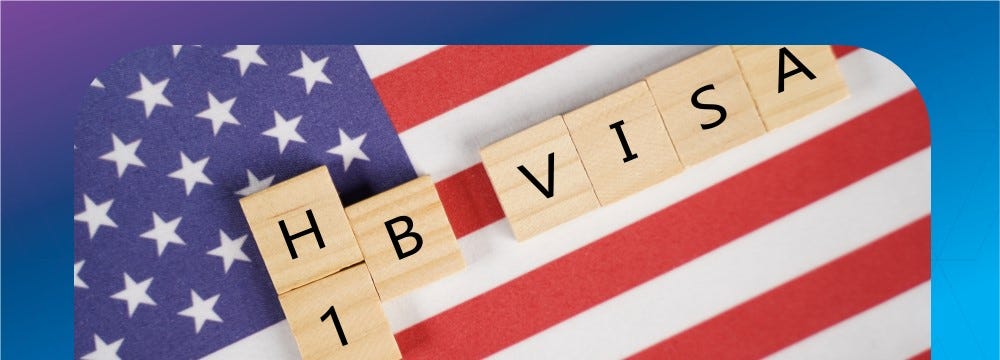


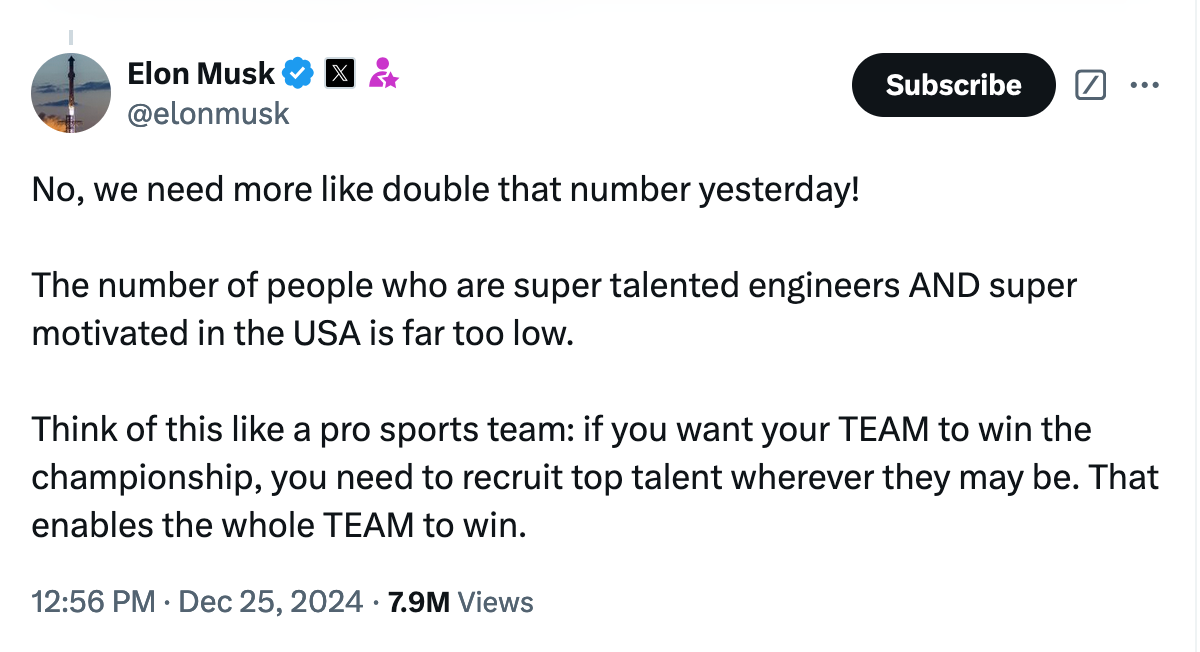
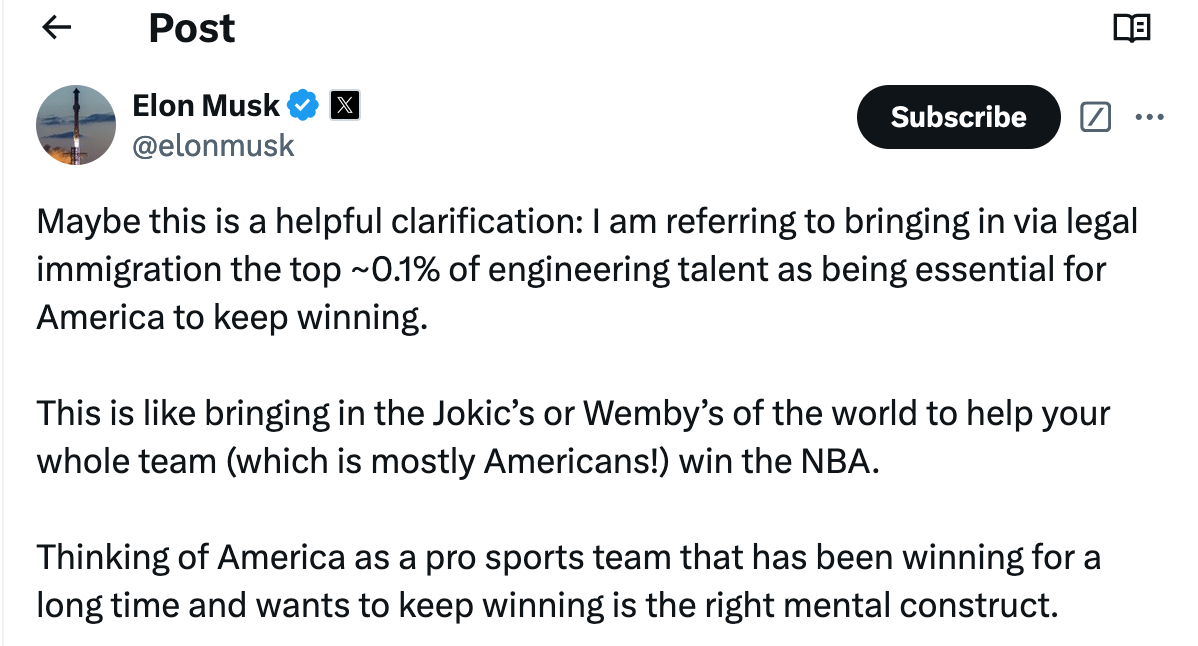

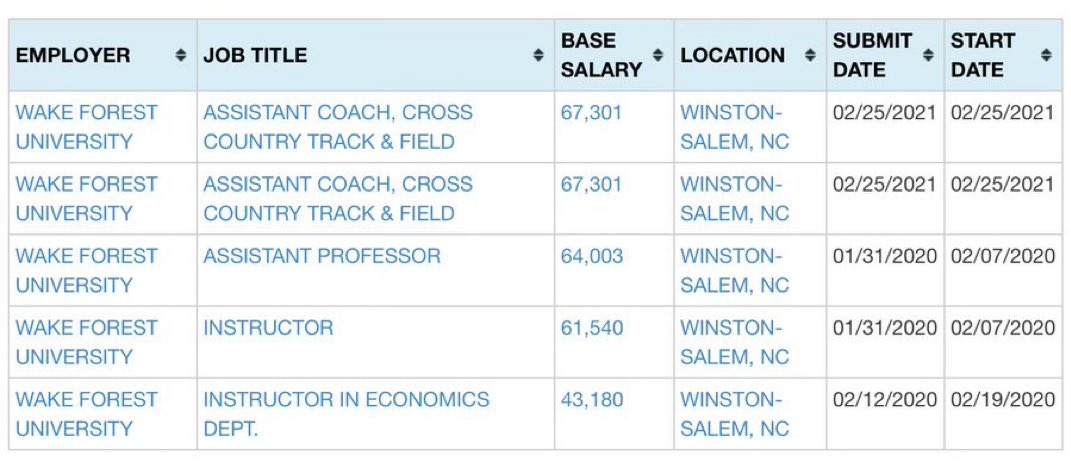
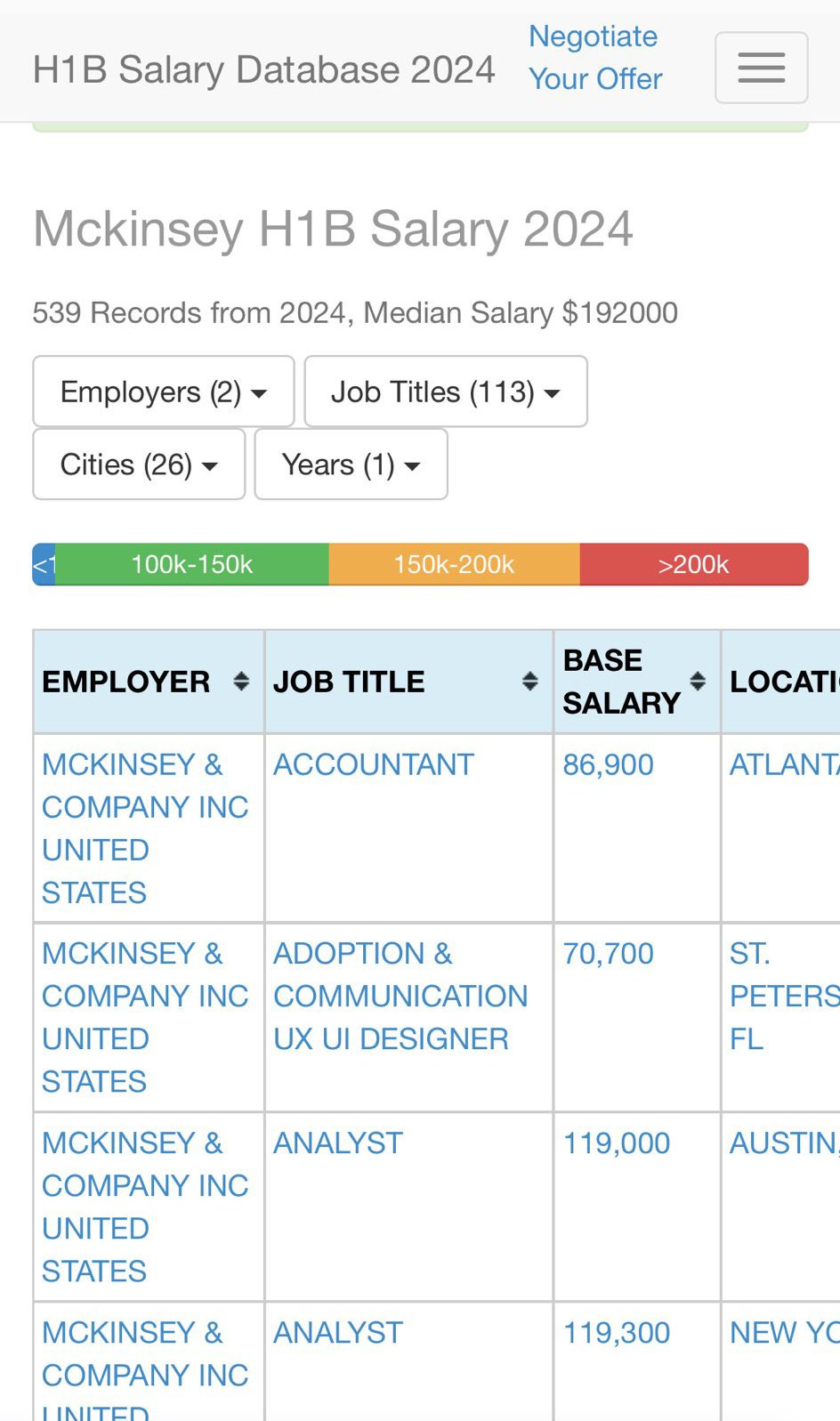
This is just what was needed to explain to me what the Latest Thing was, and what's really going on.
I am not on Twitter or X or whatever it's called these days...but this does clear up a rather baffling conversation I had with my Indian son-in-law. I was wondering why he was bringing up Zac from "Saved By The Bell"!
My other son-in-law is a data scientist who has been job hunting (unsuccessfully) for months - he has also experienced the ghosting from 98% of the jobs he has applied for.